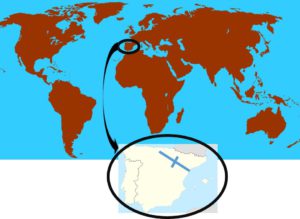DISEQUILIBRIUMS. Part 1. Chapter 1
CHAPTER 1
Ten days before…

They are rectangular, square, pentagonal, and all linked by some vertex or other and pointed in every direction. Each is a different colour, but with sides of the same thickness, just like the handle of a tennis racket. Each geometric figure is as tall as me. I look all around me, and I see hundreds, thousands, all within a black space. I can’t guess where it ends. I leap from one to another, maintaining my balance by holding on to the corners.
Here I come!
I feel myself flying within this infinite space. I’m vibrating, like one of the thousands of water bubbles in a pressure cooker, skipping, exploding, living and dying in less than a microsecond. But they are in a confined space, limited by the hot water below them and the stainless steel lid, preventing them from seeing the sky. I have more freedom than they do. Nothing confines me, although I can’t see the sky either. Simply because it isn’t there. I am dreaming. How I’m enjoying this!
I see an octagon on my right. Holding on tenaciously to the tip of the triangle from which I am now hanging, I swing myself backwards and, with a full push, release my whole body, launching myself forward to the next destination. I aim for a new target once more.
Oh no! I can’t reach it. It’s too far. I’m scared. My body is crossing the space, but I’m out of control. I can’t believe it. I’ve miscalculated. I’m getting closer and closer, but not quite close enough.
Aaaahhhh! I’m falling!
Ay! My back hits a square, pointing upwards. The pain! ….but only in my back. I can’t feel my legs. I keep falling. My right leg collides with a side of the hexagon below. I can’t feel anything. I’m scared. Have I been paralysed?
I continue to fall. My heart’s pounding a mile a minute. I can’t stop sweating. I can’t see anything, … only lines at the sides and …darkness.
I can’t stand it any longer. I cry out: ‘DADDY!’
He doesn’t answer. I keep falling. My body continues to smash against anything that’s there. ‘DADDY! DADDY!’
Aaaahhhh! The tears don’t even wet my cheeks. I can see them suspended above me, left behind while my body continues hurtling downwards at an uncontrollable speed.
‘DADDY! DADDY!’
He isn’t here.
It’s true. He’s no longer here. He hasn’t been there for some time.
Suddenly, the classmate I share a desk with, whispered into my ear:
“Sofia, do you understand anything she’s said?”
I’ve been distracted, gazing out the window of the classroom towards the forest opposite with the same thought that I’ve had for more than a year. I can’t control it. As usual, I rub my eyes to calm myself and turn around like a sleepwalker to look at my companion. It is the first time that it’s happened in a History class, but this time it’s clear, not only to me, that I seem to be bored by the class today.
“No, I don’t understand a word,” I answer Erik, primarily not to be rude.
On top of not wanting to be rude, not answering the boy you’ve started going out with and who has decided to sit next to you in class, doesn’t seem right.
Erik is tall with short blond hair and very fair skin. He was born in a small town in the north of Sweden. He looks like an athlete. Anyone would think that he is thea typical Swedish skier you see on TV, doing a ski jump on New Year’s morning, when you get up the day after the party the night before. But no, his only sport was football, and as a result, he has become very close to the other boys in class. He started at our school in September this year, having moved from his country. His parents, also Swedish, work for a renewable energies company which has a branch in Spain. The company chose Zaragoza where there is plenty of wind and sun. Moreover, according to what others have told them, it’s better than Madrid or Barcelona because it’s a quieter city with good links and they have spoken very warmly of the people.
Two things really attracted me to Erik. The first is his smile. It‘s no ordinary smile, nor is it forced. Instead, it’s natural and, what I value most, in particular, is its sincerity. I don’t know if I am strange or what, but I am fed up of people who only smile at you because they’ve been told that they have to, or they want to get something from you. I prefer they don’t smile at me at all. I don’t like it when people use it to manipulate you. A smile is something that is part of us and it has to express something we feel. Erik doesn’t smile often, but when he does… I love it.
The thing that struck me most about him is his love of music. I reckon that he plays almost every wind instrument I know. I imagine that everyone who lives in those Nordic countries has to have a special hobby, because in winter, if there’s no light, they can’t get up to much, especially Erik, who used to live in Sundsvall which is further up north from Stockholm. Erik understands all kinds of music. He enjoys them all, as he said: “Not everything fills my soul, but they all touch my heart.” Although he likes almost all sorts of music, techno, pop instrumental, soloist and even heavy metal, if he had to choose, he would always opt for jazz. The fact that the saxophone is the first instrument he learned to play when he was small, and has not stopped playing ever since, makes him feel much more in tune with that sort of music.
The only thing that I don’t feel comfortable with is the idea of having a boyfriend. I’ve always had friends who I get on well with, but this is the first time that I have agreed to go out with someone. It isn’t that I don’t like him. On the contrary, it’s more of a social thing. I’m not used to it, and I can’t quite understand why, at my age, I should be committing myself to someone else.
But all that fades into insignificance, when I look at the History teacher.
How little I like looking at her.
I can still recall the surprise of that first day of school. Something very small happened.
After the first lesson, our tutor, an elderly man dressed in an old-fashioned suit and tie, stayed behind to introduce the new History teacher. The former teacher, loved so much by everyone, retired the previous summer, after more than 30 years in the classroom. She’d always done the same job: teaching History. I don’t know how she could do it – the same thing all the time. I know I can’t. Anyway, just as the new teacher came through the door, it’s difficult to explain what happened afterwards.
The boys… it was like a scene from a talent show. As the contestant begins to sing on stage, the camera switches to the celebrities on the judging panel. Their expressions change from total indifference to one full of excitement. This is how it was with the boys. Their mouths dropped open, they put their hands to their faces and some even came close to leaping up and down. My jaw dropped too as we girls all looked knowingly at each other.
The newly appointed teacher of History was younger than 30. She was pretty, with long dark hair gathered in a ponytail, which almost reached her waist, and green eyes. She wore clothes which clung to her figure. One of boys in the class stood up and had it not been for the deadly looks from the tutor, the boys might even have burst into applause.
How could she come to give class dressed like that? I thought. Days later, and I didn’t even know how, we found out that she used to be a professional volleyball player. While she was at university, her team had won the national championship for four years running. Even now, she continues to play and, what’s more, they gave her the job of First Coach of the girls’ team in the city.
As a teacher, she must have been good because there were more than 50 candidates for the job, and it seems that everyone on the selection panel chose her. At the end of the day, we had to accept that it was a done deal. The problem is that, in addition to being lovely, she is very interested in the students. To the delight of the boys in class, she comes in a different outfit everyday. I have never imagined such a young person teaching History. If only she were male and good-looking instead… Well, it is what it is.
Today, she’s wearing tight black slacks and a beige wide blouse with sleeves that, when she stretches out her arms to give an explanation, she looks like a person in ancient times, giving a sermon. It’s true that the fall of the material under her arms is attractive and highlights what she’s explaining. From a distance, I admire the choker-style pendant hanging round her neck on a fine black leather cord, but I can’t see the symbol that’s on it.
All the same, if I had been distracted looking out the window, Miss ‘Barbie’, as we girls call her (perhaps to counteract the nickname the boys had given her) was even more so as she explains something without looking once at any of us. How could you teach without looking at your students? How could I like this woman? On the board, she’s writing a pile of historical data and dates about when the ancient Romans invaded the Iberian peninsula.
She must have felt my eyes on her. She turns round, stops and watches me. Obviously, we all have to be looking at her, but I must have been different. I think that it’s the first time that she has noticed me. Perhaps she just read the general boredom in the class reflected on my face. I would have loved to tell her like it is, but I don’t. At last, she stops watching me, and with shoulders dropping slightly, as if to release a sigh, she surveys the rest of the class in silence.
She has obviously got the message. Quickly turning around, without saying a word, she switches on the projector and turns off the classroom lights. As she does so, everyone goes quiet and watches her in the darkness. Apart from a small amount of light coming in through the window from the cloudy day outside, the only light in the classroom is the projector light on the wall. I’ve not stopped watching her. I want to see how she would react.
On the screen, we can see a large map of the Iberian peninsula with the major rivers reflected on it. Still in silence, the teacher points to the map and then, in a loud voice, asks:
“Do you know which was one of the first cities on the Iberian Peninsula to be founded by the Romans?”
In response, some classmates, surprised by Miss Barbie’s action, go back to their previously impassive attitude and some of their disappointment show on their faces. They expected something more exciting. I did too. But I’m curious to find out what her next move is.
As neither my classmates nor I answer, the teacher shouts:
“IT IS THIS ONE, THE SAME ONE IN WHICH WE ARE NOW LIVING!”
Erik and I jump. Some look at her quietly while others simply gaze around the room. In fact, Erik watches me and smiles. Although he’s only been living in the city for three months, I think that what the teacher is trying to do amuses him.
Miss Barbie draws a large dot on the Ebro River, identifying the position of the city of Zaragoza and writes its name. Then, she turns around and poses the question:
“Do you know why?”
We remain silent, waiting for her to explain. She can see that there are still some people not paying attention. I look at them. They’re the usual culprits, as always.
She again turns towards the map and sketches a vertical line crossing the Ebro River in the same place where the city of Zaragoza is positioned on the map. Then, turning to face us again, she explains:
“It is for this reason,” she said, pointing at the map, “because it is the only city in which this effect occurs.” She pauses, as if waiting for us to guess what she is going to say next. “The horizontal line intersects the vertical line at this point where the Gallego River and the Huerva River merge with the Ebro River.”

She has succeeded in getting us interested in what she is saying. It’s going well.
In the street, the wind picks up, hissing as it rushes through the window and then slamming it shut. This adds to the mysterious atmosphere.
Looking out in the distance, I can see the trees beginning to bend over. The birds have now disappeared. The sky is now heavily overcast. Grey clouds add to the sinister feel of the morning. I turn back to Erik. He is totally engrossed. The light from the projector flickers more brightly than before.
“You see the rivers crossing each other,” she continues, “that was a great omen for the Romans. Emperor Augustus, the founder of the city, believed that the goddess of Nature, Cybele, had created the sign of Cardus and Decumanus – two perpendicular lines, which the Romans used to design their cities. Cardus was the main street which ran from north to south, while Decumanus ran from east to west. So, from this design, the other streets in the city would be built in regular parallel lines, perpendicular to those built before them.”
She stops, stares at us and walks slowly from left to right across the classroom. Today, she hasn’t put her hair up in a ponytail. As she moves, her hair sways from side to side. All our eyes are on her now.
“A perfect Cardus and Decumanus was an expression of the sacred order of the Earth’s cosmos for them.”
At that moment, she halts in front of a student sitting at the end of the first row on the right. Leaning, with her hands on his table, she turns her face towards the window and we can hear her saying:
“In other words, this was a sacred city for them.”
(…)
You can support the project and
buy the book:
Writer: Glen Lapson © 2016
English translator: Rose Cartledge
Publisher: Fundacion ECUUP
Project: Disequilibriums
Register on the website www.disequilibriums.com and you will receive a notification to allow you to read the chapters as they are published and updates of the project.
Var 1,126


No Comments